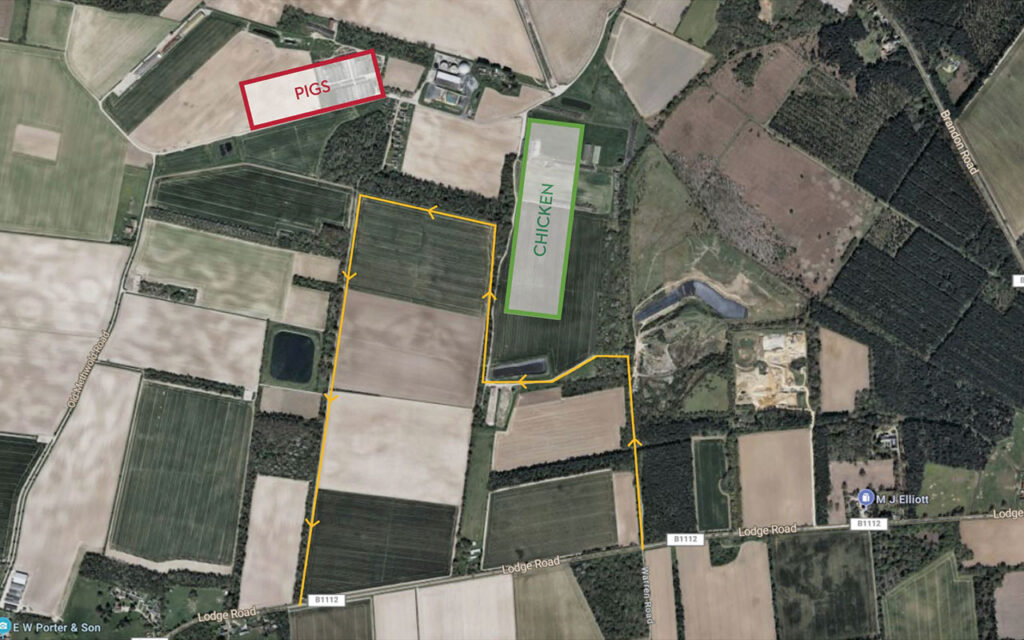Cranswick said it was considering its options after King’s Lynn & West Norfolk Borough Council Planning Committee unanimously rejected its application for a large pig and poultry unit in Norfolk.
After a three-year process that encountered various delays and generated huge opposition, Cranswick had been seeking permission to expand an existing site to house 14,000 pigs and 714,000 chickens near the villages of Methwold and Feltwell.
Following the three-hour hearing, a Cranswick spokesperson said: “We are incredibly disappointed by today’s decision. This a bad day for the sustainable production of British meat. We’ll now take time to review the decision and consider the options available to us.”
NGOs that had campaigned against the development described it as a ‘landmark decision’, however. Sustain and Feedback said failure to include information on full direct and indirect greenhouse gas emissions in the application was considered grounds for rejection by the council’s planning experts, in what will be ‘a significant boost for climate campaigners but a damning indictment for UK megafarms’.
Lily O’Mara, Climate Campaigner at Sustain, said: “Local authorities are waking up to the reality of industrial farming: a damaging and extractive system of food production that poses a serious threat to human health and our country’s future, both economically and environmentally.
“King’s Lynn and West Norfolk Council has rightly put nature and communities first by saying no to a development that would have sent us in completely the wrong direction.”
Jake White, head of legal advocacy at the WWF, said: “This is a well-deserved win, not just for the environment but for the local community who united to oppose this unpopular, unlawful and unsustainable megafarm.
“We are delighted that the people of Methwold have got the result they wanted following the council’s robust consultation process.”
Terry Jermy, the MP for South West Norfolk who had vocally campaigned against the development, called it a ‘victory for local people and the environment’, Lynn News reported.
“I said from the beginning, no ifs, no buts, the megafarm should not go ahead and I am delighted that the application has been rejected. With over 15,000 objections and numerous of legal concerns raised based on environmental breaches this is an important victory,” he said.
A borough council spokesperson said: “Our role in determining this application is to ensure that the planning process is conducted professionally, objectively and thoroughly, and we are confident that this is what has happened today.
“We thank all parties involved, in particular the members of our planning team and our planning committee, for their careful analysis and consideration of the issues, to help us reach this decision.”
Uphill battle
Cranswick was always facing an uphill battle to win the day, after planning officers recommended that the application should be refused, in a 200-page report published in March.
With the site lying close to a number of European protected sites, the report said Cranswick had failed to demonstrate that the development ‘would not result in significant adverse effects on the protected sites’.
They also concluded that insufficient environmental information had been submitted to enable the council to reach a view on the impact of the project on the environment and climate change.
The report stated: “The public benefits of the development as proposed are outweighed by the potential environmental impacts of the scheme. The Council are not in a position to fully assess these impacts, despite the number of opportunities presented to the Applicant to submit further information, and as such the application should be refused.”
Cranswick hit back, issuing a robust response that was heavily critical of the council in its statement to the planning committee.
It reiterated its arguments that the development would ensure better use of local land, improving the existing site, which currently permitted by the Environment Agency to house 29,000 pigs; deliver higher welfare for pigs and poultry and improve British food security, reducing the country’s reliance on imports.
Cranswick refuted the ‘mega farm’ tag, pointing out that the pigs, for example, would be housed in 14 straw-based buildings similar to those used across the country.
It said the application was about producing more British food, to higher welfare standards, through the redevelopment of existing farms. The renovated site would produce 0.5% of the pigs, and 0.5% of the chickens, reared in the UK.
“At a time of rising prices, trade wars and escalating international tensions, now is the time Britain needs to produce more food at home, using modern, efficient and sustainable forms of farming,” it said in its final briefing to the planning committee.
“Not doing so will have a detrimental impact on UK economic growth, on food prices for consumers locally and nationally, and on direct and indirect employment opportunities, within Norfolk and across the wider UK.”
Cranswick said it ‘fully recognised that a range of concerns and views have been expressed by local stakeholders and residents’, and had worked hard to address the issues.
But, with reports that the proposal received around 15,000 objections, alongside a handful of submissions in support, Cranswick claimed that 90% of the objections came from outside the local area, defined as a 10km radius around the site, with many from outside the UK, including Rome, Lisbon, Calgary and California.




